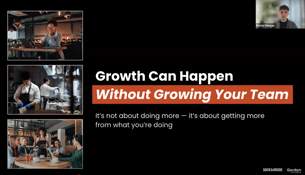When you’re opening a restaurant, the single word seared into your mind is going to be “location.” That goes double and triple when you’re opening a second or a third … location.
Finding the right place for your establishment means learning all you can about an area and the people who live there. Since the dawn of time, restaurant operators have essentially winged this process. But now, you’re doing yourself a disservice if you don’t take advantage of the oceans of demographic data that can inform your decision.
You want to know as much as you can about the people your restaurant might serve. How much money do they make? How big are their households? Do they live there year-round? Are they raising kids or supporting extended families? Are they retired? Their age, their countries of origin, their levels of education — all of this can help you determine whether your restaurant is a fit for a given spot. And if you decide you are a fit, it will help you set realistic goals.
Some of this data is publicly accessible; other data are proprietary. And you might do well to get a professional analyst to help you parse it, regardless. To help you make data-driven decisions for your restaurant on any budget, I spoke with Richie Karaburun, an NYC hospitality professor, for recommendations.
Free data resources for picking a restaurant location
The Census Bureau
After more than 120 years, it’s the grandparent of demographic data in the United States. When you want to look at cities, counties, states, or individual ZIP codes, start by using the site’s Quick Facts tool. With that you can get some broad figures on the age, sex, racial makeup, income, and educational backgrounds of people in an area, or learn for a few finer data points: the average commute time, the value of people’s homes, the gross retail sales in the area.
City-data.com
Entrepreneurship classes turn to this site for more granular demographic data. Their basic tool is free, easy, and fast. It also offers more comparative data at a glance, and is visually easier to navigate than the Census tables. “If you want to open a restaurant in the city, plug in the ZIP code, and you get exactly the data you need,” Karaburun said. “This could be one of the best free resources in addition to the U.S. Census Bureau.”
Your local university
Academic institutions have access to paid resources and often do local industry research. Researchers — be they professors or students — often engage businesses in the specific field of study relevant to respective programs. Look around your area for colleges or universities with hospitality programs and introduce yourself. You may be able to develop a partnership that can help you answer your questions while furthering someone’s research, your classic win-win.
Paid data resources for picking a restaurant location
Your quick glance at a ZIP code or town might help you narrow your choices. Before you plop down a deposit, though, you may want to hire a firm or for further restaurant marketing insights. In any event, request a demo. Look at the data a firm or consultant can provide, and ask yourself how their analysis benefits the questions you’re asking. There’s a lot of noise out there, so stay focused and don’t get overwhelmed.
Some services for restaurant market data include:
Statista
Academics who study hospitality dig Statista, a leader in consumer data. You can get some very broad restaurant data for free, or pay for access to more actionable, meaningful data. Accounts start at $39 per month and run on an annual basis.
Data Axle
This consumer database offers extensive demographic data as well as marketing solutions such as email and direct mail. You can select a data set to explore based on a handful of selected metrics starting at $775 exported and sent as an Excel spreadsheet, or you can start a subscription for $99 a month for up to 500 monthly data set downloads. Data Axle is on the pricier side, but their customer service is very helpful and an annual subscription may be worth the investment for both the planning and initial marketing phase of launching your restaurant.
Your local data consultant
As a restaurant operator you know nothing about this business can be reduced to pure numbers. In the way you’d look for a real estate agent with deep local knowledge before buying a house, you should seek out consultants in your city or town who know the local economy. For all the assurances you can derive from making decisions with a strong foundation of data, you also can benefit from a professional whose business it is to interpret and analyze that data. Tap into your network of fellow restaurant operators who have opened successful locations in the areas you’re considering and ask: Who did you get to help you make this decision? Sometimes that will be the most important data point of them all.
[Photo by Ethan Hoover on Unsplash]





